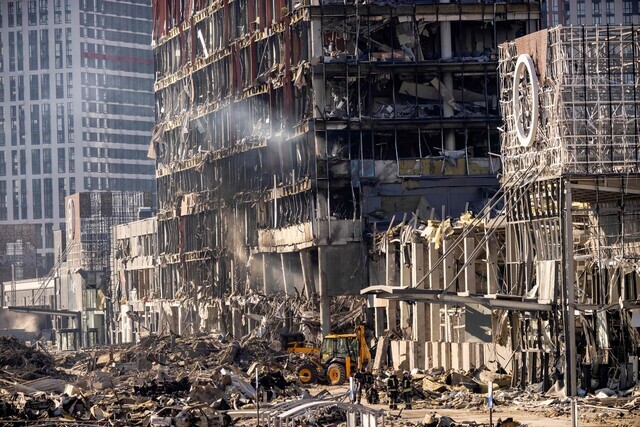Does Ukraine war mark shift from globalization to regional economic blocs? One expert says yes
Kim Seok-hwan called the war an “inflection point” for global politics and economics

Firefighters carry out a search and rescue on March 21 at the ruins of a residential complex and shopping center in Kyiv, Ukraine, that was bombed by Russian forces during the ongoing war there. (AFP/Yonhap News)
“There are two wars going on simultaneously. This is an inflection point, where the political and economic situation in the global village is shifting.”
In a videoconference seminar Tuesday, the Korea Institute for Industrial Economics and Trade (KIET) shared its analysis that the situation in Ukraine will have profound geopolitical significance, with its major impact extending to South Korea as well.
Kim Seok-hwan, a visiting professor at Hankuk University of Foreign Studies, said during the debate that the war “is taking on an aspect of two different wars happening simultaneously: a geopolitical war and an economic war.”
“The war’s ramifications will take several forms, the most important of which is the greater likelihood of a ‘hybrid crisis,’” he added.
He went on to say, “The key issue is not the scale that Russia and Ukraine represent in global trade or the size of their gross domestic product (GDP). There is a great risk of severe disruptions to productions with strategic importance, along with key metal resources and workers.”
In particular, he warned that the strategic items supplied by Russia could lead to simultaneous disruptions in the workforce, technology, and other markets related to the Fourth Industrial Revolution. He also predicted the possibility of a worst-case scenario for South Korea involving inflation, financial volatility (including exchange rate effects), reduced trade, supply chain disruptions, and growing geopolitical crisis.
“We could see the arrival of an era of division and the end of the globalization era that has been sustained since the Cold War ended, while in the longer term we could see the formation of new, large-scale regional economic [blocs],” he predicted.
“The Russia-Ukraine situation could function as an inflection point, where the political and economic situation in the global village undergo a shift,” he said.
Commenting on the effects of the Ukraine situation on South Korean manufacturing, KIET senior researcher Kim Ba-woo predicted, “The impact of reduced trade with the countries involved in the conflict is expected to be minor.”
“The main effect will be a ripple effect owing to the rise in the prices of energy and major raw and subsidiary materials,” he added.
He also noted, “While Russia’s export restrictions apply for the most part to foreign-made items, there have recently been export restrictions in the areas of domestically produced timber, sugar, and grains, which means we will need to focus on developments in terms of the West ratcheting up sanctions and Russia’s response measures.”
In an analysis of Western economic sanctions and Russia’s response to them, KIET research fellow Kim Hak-ki said, “The West’s economic sanctions against Russia are focused on Russia’s advanced technology and arms industry areas as part of a competition for dominance.”
“Their focus is on preventing Russia from gaining power and restricting its increase in economic scale,” he concluded.
He went on to predict that Russia’s retaliatory sanctions could deal a blow to the economies of “unfriendly” states, including South Korea.
Russia’s retaliatory sanctions have included embargos on food items; import restrictions on foods, pharmaceuticals, and other products; development of import substitutes; and the suspension of rocket engine and rare metal exports.
By Kim Young-bae, senior staff writer
Please direct questions or comments to [english@hani.co.kr]